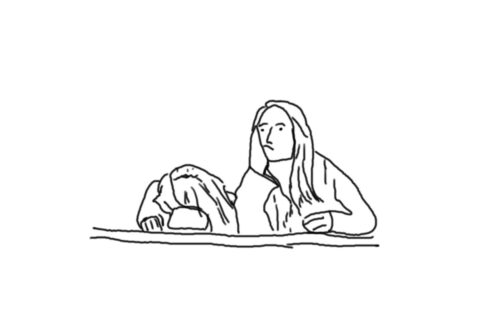The second challenge to apologetics is skepticism. The Skeptic suggests that even if there are mind-independent truths, we cannot know what they are.
The problem with being a skeptic is that if one doesn’t think one can know the truth, then one won’t be inclined to defend it. No one is prepared to die for something that could very well turn out false.
There are many ways to be a skeptic. One might suggest that we can always find ways to doubt what we believe. Perhaps you are a brain in a vat. How would you know that you are not merely a brain being stimulated in ways that bring about all your experiences? Alternatively, we might find ways to doubt our mechanisms for reasoning. How do we know that our scientific methods produce reliable conclusions? Perhaps we have got it all wrong.
One, more recent, kind of skeptic appeals to the causal history of a set of beliefs. The skeptic of this kind might claim something like the following:
“I believe what I believe because I was taught that way. But I can’t say for sure that what I believe is actually true of the world. For example, I believe that cats are mean, and dogs are nice. Why do I believe such a thing? Well, it’s not something I can know to be true. I just got taught that sour faces indicate meanness. And what could be a sourer face than a cat’s face. I also got taught that nice faces usually have drool down them and a tongue hanging out. But I can’t know that. It’s just the way I was brought up. This is true with religion, by the way. I think of God in one way, but many other people think of him in a different way. You think of him as harsh; I think of him as friendly. Who’s to say which one is right? People just pick up their interpretations of the world from their environment. I know many really beautiful people who disagree with me. Who am I to say that I am right, and they are wrong? How arrogant I would be to say so.”
Examples of this are found in philosophical writings of people like Fredrich Nietzsche, Sigmund Freud, and Karl Marx. Take, for example, Nietzsche’s approach to ethics. In A Genealogy of Morals, he argues that one should be skeptical of our moral principles once one sees from whence they come. He claims that by examining the causal story of a certain moral conception of the world, we can come to doubt its universality. He argues that Christian morality, which he calls, ‘slave morality,’ has its origins not in divine revelation, but in resentment:
“The slaves’ revolt in morals begins with this, that resentment itself becomes creative and gives birth to values” (The Portable Nietzsche, 451).
When speaking about the adoption of liberal values, he dismisses them as English values. He argues that all his opponent wishes to do is impose his version of morality.
“Observe, for example, the indefatigable, inevitable English utilitarians…In the end, they all want English morality to be recognized as authoritative…They would like…to convince themselves that the striving after English happiness…is at the same time the true path of virtue; in fact, that insofar as there has been virtue in the world hitherto, it has just consisted in such striving.” (Nietzsche, Beyond Good and Evil).
For Nietzsche, once one exposes the origin of a belief, one can doubt it.
Marx too, when dealing with objections to his Communist Manifesto, replies that the reason one might have objections is because the objector is bourgeoisie. Once the objector experiences the joys of communism (of which there are in fact none, by the way), Marx evidently thinks that such bourgeoisie beliefs will disappear (either naturally or by ‘re-education’).
Religious beliefs are no different. As Joseph Runzo writes,
“Religious beliefs, like many philosophical orientations, seem largely an accident of birth. If you are born in India, you are likely to be a Hindu; if born in France, you are likely to be a Christian. Moreover, on their own grounds, Buddhists and Muslims and adherents of other great religious faiths, seem rationally justified in their beliefs.” (Runzo, “God, Commitment, and Other Faiths,” in Faith and Philosophy 5, 342).
Once one realizes the origin of one’s beliefs, this kind of skeptic thinks we have good reason to doubt the beliefs we have. And if we do doubt our beliefs in this way, our commitment to defending our own beliefs will be greatly diminished.
Is this right? Should we lower our confidence in our beliefs on learning about their origins?
The first way to respond to such a suggestion is to claim that just because you can explain how one came to believe something, it doesn’t follow that it is false. The source of a belief doesn’t tell us whether it is true or not. This is a form of the genetic fallacy.
Still, someone might say that finding out the source of our belief should at least make us lower our confidence in it.
Suppose I am given statistical evidence that 99% attendees of Southeastern Baptist Theological Seminary believe in the doctrine of inerrancy and only 1% of attendees of Harvard do so. Perhaps you attended Southeastern and are one of the 99%. Now, you may claim that you came to Southeastern because you were already committed to inerrancy. But imagine if the attendees had no view on the matter when they first began at school and imagine that they had access to the same objective evidence in order to make up their minds.
Now, one can explain the beliefs of attendees as being caused by their respective academic environments. Are they merely ‘swayed by the evidence’ or does the academic environment (and not the objective evidence) explain their respective positions? Since they had the same evidence, it cannot be the evidence. Thus, there are other factors at work.
The trouble with this sort of skeptical challenge is that it supposes that you will be led to doubt your view once it has been shown to you that your view does not depend solely on the evidence (both Harvard and Southeastern students had the same evidence provided to them). But this still doesn’t tell us whether the doctrine of inerrancy is true or not. It only tells us that there are other factors that determine what we come to believe. We can all agree on that! The skeptic assumes that merely by informing us of those other factors (conditioning etc.) that we will begin to doubt our beliefs. What he is trying to get us to admit is that we cannot know who is right and who is wrong. But it does not follow from there being other factors in our decisions that there is no way to tell who is right and wrong, that we can’t tell either way.
The skeptic might reply that we are still stuck in our paradigms: we not only acquire beliefs in certain environments, we also acquire ways in which we see the world. We have been caused to have particular conceptual schemes as a result of upbringing, culture, personal psychology, or experience. The skeptic might claim that those conceptual schemes determine the way we evaluate evidence. Thus, we can never be objective.
But from having a conceptual scheme, it does not follow that one must employ it in every instance. For example, perhaps I have been brought up English with English sensibilities and the accompanying propensity towards social awkwardness, tea, and the monarchy. Call my conceptual scheme, an English conceptual scheme.
Now, suppose I marry an American and move to America. During my time in America, I am asked to consider whether one can be oneself in social situations, whether coffee is in fact better than tea, and whether monarchs have the right to rule in virtue of the family into which they were born. The question is: does my possession of an English conceptual scheme determine my response to these issues? In other words, must I apply the conceptual scheme that I possess, or can I put my scheme on notice and be objective?
The answer is that it does not follow from possessing a conceptual scheme that one must apply it in every instance (see Feinberg, 2013 for further argument to this effect). One might have a propensity to follow it, but one is not determined by it. Indeed, although the social awkwardness remains a work in progress, I have come to think that coffee is better than tea and that monarchs possess no such right to rule! Giving up such beliefs and adopting new ones is not merely down to social pressure. It can be had by objectively assessing the evidence!
If one thinks of beliefs being determined in such a way, one cannot also claim that there can be anymore than a difference of opinion. There could be nothing like a defense of the faith. Defending the faith is a matter of demonstrating its truth and doing that requires that we think the person to whom we are defending it can objectively evaluate the arguments.
There is something deeply hopeless about saying the following:
“The truth might be real, but my beliefs are always determined by my upbringing/experience. Thus, I should listen to multiple perspectives.”
What is useless is that if upbringing/experience always shapes beliefs, then it is not easy to see what good would come of listening to other perspectives. Either those perspectives turn out to be the right ones or they won’t. But if you can’t help having your beliefs determined by you adopted conceptual scheme, you won’t ever know which one is right. You can never be objective.
One should listen to other perspectives only if it is possible to figure out who’s actually right on the matter. But there would be no point in doing so if there is no way to avoid applying your own subjective conceptual scheme. All you can hope for is a change in that scheme; you can’t hope to get at the truth. And if you can’t hope to get at the truth, you won’t be inclined to defend it at any point.
Next, and final, challenge: The challenge of pragmatism.





